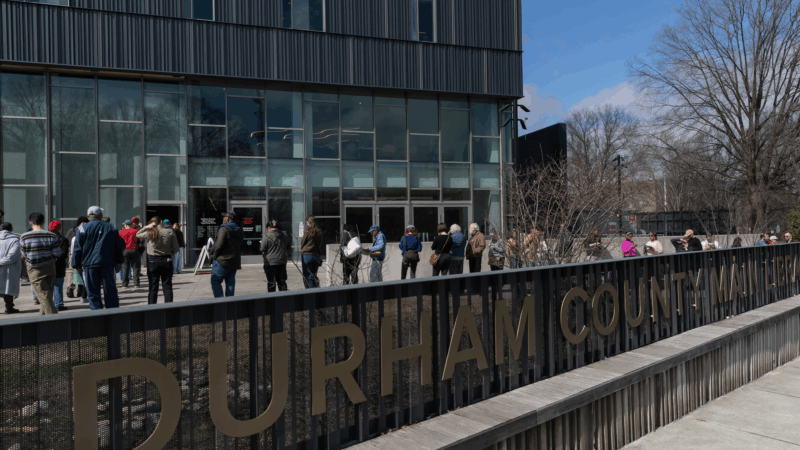Alabama describes proposed nitrogen gas execution
MONTGOMERY, Ala. (AP) — Alabama’s proposed procedures to carry out executions with nitrogen gas include fitting a mask over the inmate’s face and replacing their breathing air with nitrogen until their heart stops.
The state described the procedures for the proposed new execution method in a redacted court filing. Alabama is seeking to become the first state to execute a prisoner using nitrogen. Nitrogen hypoxia has been authorized as an execution method in Alabama, Oklahoma and Mississippi, but no state has used the method to carry out a death sentence.
Nitrogen makes up 78% of the air inhaled by humans and is harmless when inhaled with proper levels of oxygen. Under the proposed execution method of nitrogen hypoxia, an inmate would be forced to breathe only nitrogen, depriving them of oxygen needed to maintain bodily functions and causing them to die.
Alabama Attorney General Steve Marshall on Friday asked the Alabama Supreme Court to set an execution date for Kenneth Smith, 58, using nitrogen hypoxia as the method of execution. The attorney general’s office included a redacted copy of the protocol in a court filing asking a judge to dismiss a lawsuit filed by Smith. Smith, in seeking to block the state’s second attempt to execute him by lethal injection, had argued that nitrogen should be available.
According to the protocol, the inmate would be escorted into the execution chamber, now used for lethal injections, placed on the gurney and have a mask fitted over their face. The warden would then read the death warrant and give the inmate a chance to give a final statement up to two minutes long. Execution team members would then make a final inspection of the mask. The warden, from another room, would then “activate the nitrogen hypoxia system.”
“After the nitrogen gas is introduced, it will be administered for 15 minutes or five minutes following a flatline indication on the EKG, whichever is longer,” the procedures stated.
If Alabama carries out an execution by nitrogen, it will be the first new execution method since lethal injection was introduced in the 1970s.
Deborah Denno, a death penalty expert at Fordham Law School, said that unlike lethal injection and electrocution, which have been used for decades, “experts could only speculate about how a state might conduct a nitrogen hypoxia execution.” She said the filed Alabama protocol does not provide answers because of its vagueness and heavy redactions.
“This is a vague, sloppy, dangerous, and unjustifiably deficient protocol made all the more incomprehensible by heavy redaction in the most important places,” Denno wrote in an email.
John Palombi, an attorney representing several death row inmates, said “it will be difficult to fully analyze this protocol until a far less redacted version is made available.”
“This is a complex procedure and we have every right to be concerned when the Department of Corrections is not transparent about it, particularly when they have had such a bad track record recently,” Palombi wrote in an email.
Alabama attempted to execute Smith by lethal injection last year, but called off the execution because of problems inserting an IV into his veins. It was the state’s second such instance within two months of being unable to put an inmate to death and its third since 2018. The day after Smith’s aborted execution, Gov. Kay Ivey announced a pause on executions to conduct an internal review of lethal injection procedures. The state resumed lethal injections last month.
Alabama lawmakers approved nitrogen hypoxia as an alternate execution method in 2018 as death penalty states faced difficulty obtaining lethal injection drugs and ongoing litigation challenging the humaneness of lethal injection.
“It’s readily available. It’s 78% of the air we breathe, and it will be a lot more humane to carry out a death sentence,” Trip Pittman, the former Alabama state senator who proposed the new execution method, said.
Pittman said the inmate will pass out — similar to how aircraft passengers pass out when a plane depressurizes — and then die.
Pittman disputed criticism that the method is experimental. He said that while no state has carried out a death sentence with nitrogen, people have died by breathing nitrogen during industrial accidents and suicide attempts, so the effects are known.
Smith was one of two men convicted in the 1988 murder-for-hire slaying of Elizabeth Sennett. The other man convicted in the killing was executed in 2010. Charles Sennett, the victim’s husband and a Church of Christ pastor, killed himself when the investigation began to focus on him as a possible suspect, according to court documents.
The candy heir vs. chocolate skimpflation
The grandson of the Reese's Peanut Butter Cups creator has launched a campaign against The Hershey Company, which owns the Reese's brand. He wants them to stop skimping on ingredients.
Scientists make a pocket-sized AI brain with help from monkey neurons
A new study suggests AI systems could be a lot more efficient. Researchers were able to shrink an AI vision model to 1/1000th of its original size.
U.S. evacuates diplomats, shuts down some embassies as war enters fourth day
The United States evacuated diplomats across the Middle East and shut down some embassies as war with Iran intensified Tuesday while President Trump signaled the conflict could turn into extended war.
North Carolina and Texas have primary elections Tuesday. Here’s what you need to know
The midterm elections are officially underway and contests in Texas and North Carolina will be the first major opportunity for parties to hear from voters about what's important to them in 2026.
Kristi Noem set to face senators over DHS shutdown, immigration enforcement
The focus of the hearing is likely to be on how Kristi Noem is pursuing President Trump's mass deportation efforts in his second term, after two U.S. citizens were killed by immigration officers.
College students, professors are making their own AI rules. They don’t always agree
More than three years after ChatGPT debuted, AI has become a part of everyday life — and professors and students are still figuring out how or if they should use it.








